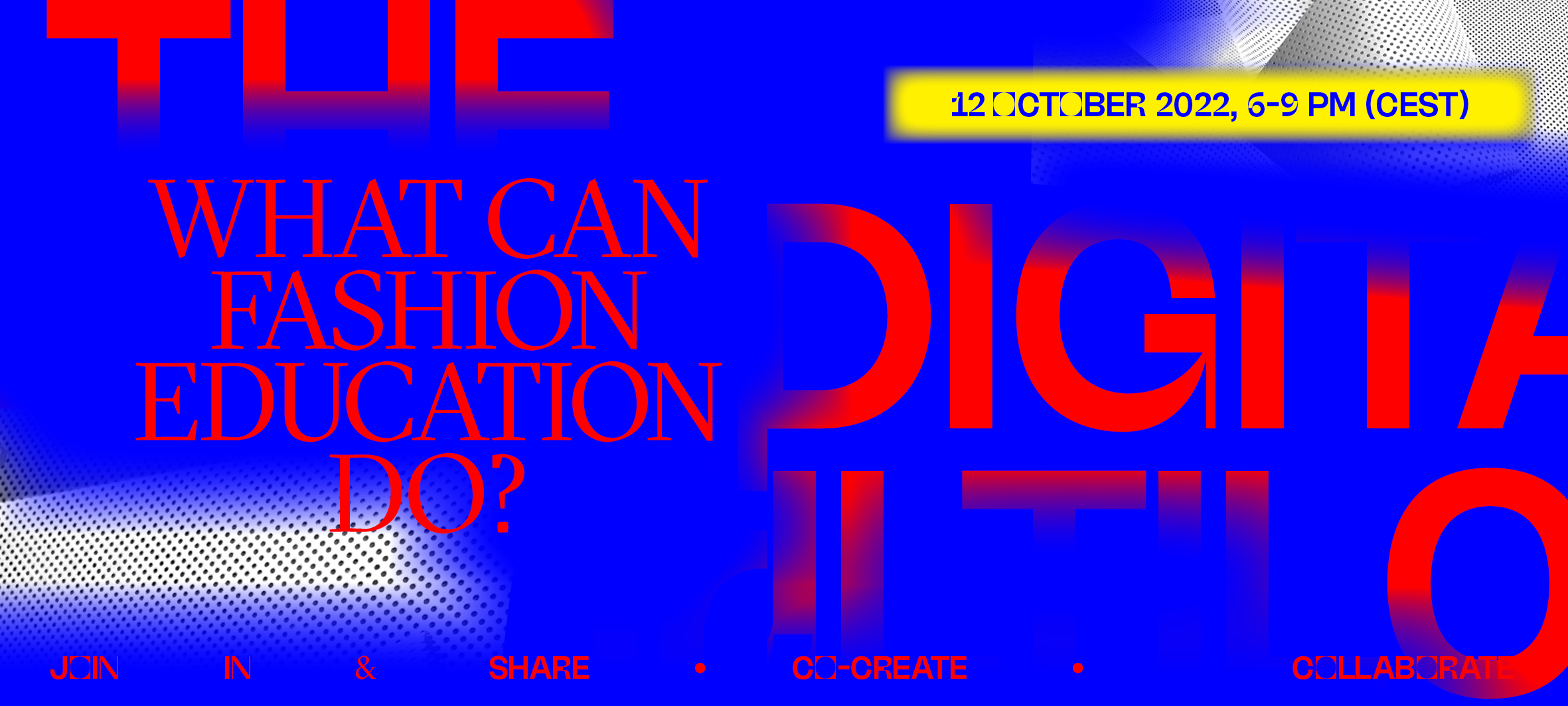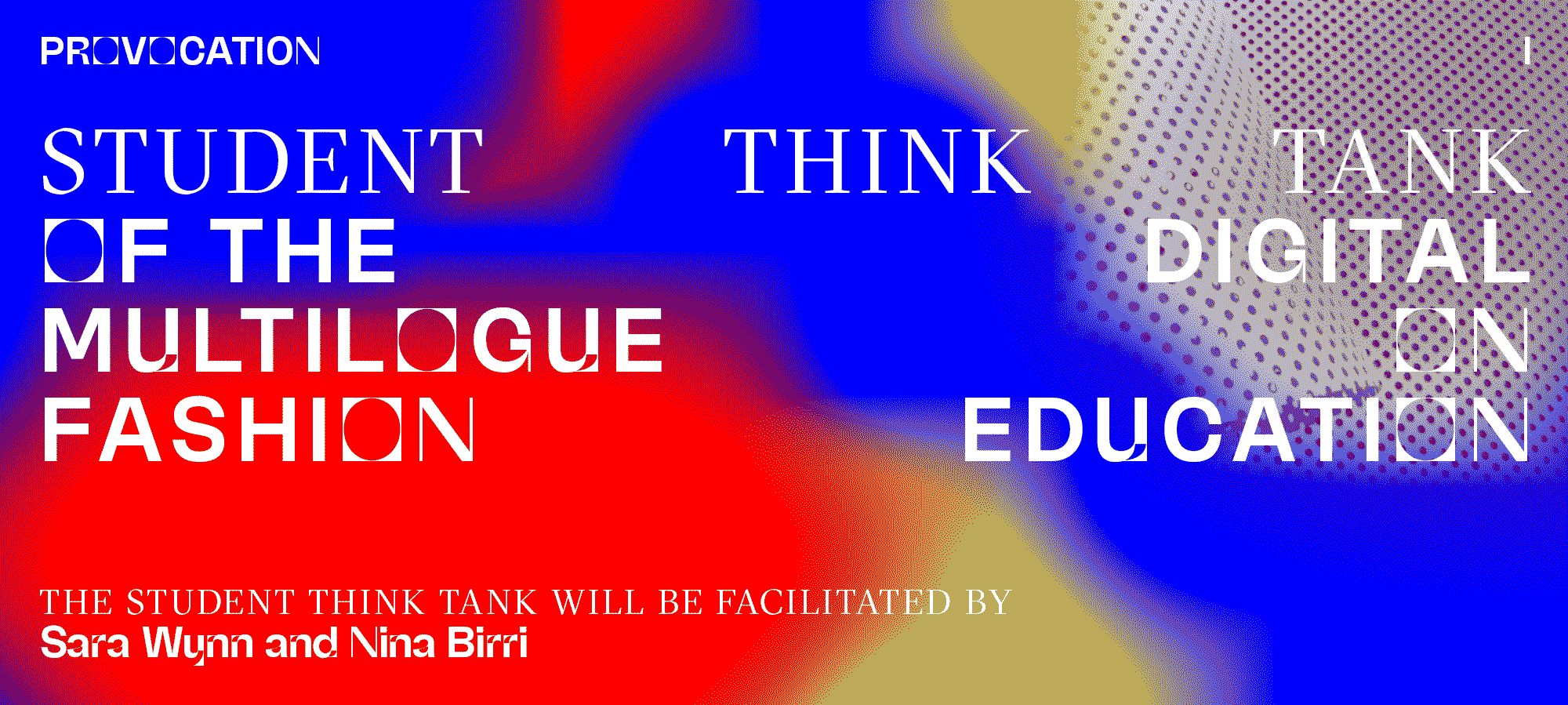
This question leads the third edition of the Digital Multilogue on Fashion Education – a series of participatory and outcome-oriented conferences focused on learning and teaching of fashion at tertiary level organised by Franziska Schreiber and Renate Stauss. The Multilogues aim to explore and illustrate the diversity and complexity of the field and its practices, and to foster a greater understanding of methods, values, and didactic pedagogic, and epistemological questions – in creating a global exchange. While the Multilogue 2021 brought the community of fashion educators together for a two-day conference to create multiple dialogues and initiate collaboration, this year’s edition will be a rich three-hour online experience geared towards global connection and interaction to explore activist learning and transformative teaching in fashion education. Clare Farrell (Extinction Rebellion, London), Lesiba Mabitsela (fashion practitioner, co-founder African Research Institute (AFRI), Johannesburg), and Tanveer Ahmed (Senior Lecturer for Fashion and Race, Central Saint Martins College London) will join and voice their provocations. Participatory exchange will be enabled by Creative Destructions with conversation designer Ruben Klerkx.
The event is friendly supported by The American University of Paris, netzwerk mode textil &
Culture(s)
de Mode.

PROVOCATION I
Student Think Tank of The Digital Multilogue on Fashion Education
with Aimée Grünewald, Codi Körner, Constantin Prückner, Melchior Rasch, Fiona Schlumberger, Ava Sirulnick, Lulu Stones & Jill Theisges
What can fashion education do?
While both students and educators are lifelong co-learners, this think tank focuses on the student perspective in particular to explore what fashion education can do, and what support and enablement are needed bringing together students from The American University of Paris (AUP) and the Berlin University of Arts (UDK). The student think tank was facilitated by Sara Wynn and Nina Birri.
Nina Birri is a recent graduate from the MA Design (Fashion) program at the Berlin University of the Arts, where she explored the potential of upcycling and serial one of a kinds as a way to create novelty in times of material scarcity. She is currently in the process of setting up a design studio and is part of the Creative Prototyping X Sustainability Programme at UdK. Nina also holds a BA in International Business Management and has been working as a service designer, user researcher and workshop facilitator.
Sara Wynn is a recent graduate from the MA Global Communications Fashion Track program at AUP. With a degree and professional history in fine arts, fashion, & textile design, Sara is now focusing on sustainable textile practices and becoming an advocate for a more ethical fashion system.
The Student Think Tank is friendly supported by The Senat Chancellery Berlin

PROVOCATION II
Clare Farell
Extinction Rebellion, London
What can WE do in fashion
education?
Clare Farrell will speak about the fashion education space and how it can help people and especially young people to reimagine the world at this time of systemic crisis. Considering what we think and teach about, regarding the history of our global industry, recognising fashion and clothing systems as just that, rather than always looking through the lens of business, commerce, and advertising.
Teaching on creative subjects and in particular design subjects, we must consider the values we encourage students to work to, the skills we might need in the future, and the models we could use to make innovation rooted in sufficiency and meeting needs rather than creating them. This is in essence a paradigm shift and fashion has the cultural potential to either help or hinder at this moment of great change.
Clare Farrell is an active citizen, devoting her creativity, her energy, and occasionally her personal liberty, to fight against climate collapse and the wider environmental crisis. As one of the cofounders of Extinction Rebellion her work to date has included coordinating the creative team that delivered the name, identity, and messaging that the movement set out with in 2018, co-editing the bestselling book, This is Not a Drill, and now works with the UK media team and acts as a spokesperson.
Clare has a professional background in the UK fashion industry, working across the high street, luxury and ethical sectors. She has been educating on fashion, ethics and sustainability for over a decade.
Clare Farell
Extinction Rebellion, London
What can WE do in fashion
education?
Clare Farrell will speak about the fashion education space and how it can help people and especially young people to reimagine the world at this time of systemic crisis. Considering what we think and teach about, regarding the history of our global industry, recognising fashion and clothing systems as just that, rather than always looking through the lens of business, commerce, and advertising.
Teaching on creative subjects and in particular design subjects, we must consider the values we encourage students to work to, the skills we might need in the future, and the models we could use to make innovation rooted in sufficiency and meeting needs rather than creating them. This is in essence a paradigm shift and fashion has the cultural potential to either help or hinder at this moment of great change.
Clare Farrell is an active citizen, devoting her creativity, her energy, and occasionally her personal liberty, to fight against climate collapse and the wider environmental crisis. As one of the cofounders of Extinction Rebellion her work to date has included coordinating the creative team that delivered the name, identity, and messaging that the movement set out with in 2018, co-editing the bestselling book, This is Not a Drill, and now works with the UK media team and acts as a spokesperson.
Clare has a professional background in the UK fashion industry, working across the high street, luxury and ethical sectors. She has been educating on fashion, ethics and sustainability for over a decade.
PROVOCATION III
Lesiba Mabitsela
Fashion practitioner, co-founder African Research Institute (AFRI), Johannesburg
Can the work of transforming fashion education be done by the very same institutions that have dictated the canon‘s narrative for so long?
Punk, by it's accepted definition exists as a phenomenon that is built on the values of not giving a fuck - of diy culture, of marginalised communities, anti-capitalistm anarchism, and anti-institutionalism. Punk exists as an example of counter culture which is unpredictable, unfathomable, unattainable and begins to dissipate at the mere attempt to own it. I have come to this reflection following recent challenges (both professional and personal) with trying to tell an authentic alternative reading of punk as decolonial praxis through funded/corporate entities whilst aware of the role capital plays in the lives of the marginalised (particularly within the hustler mentality of Johannesburg), I have had to ask whether the work of transforming fashion education can be done by the very same institutions that have dictated the canon's narrative for so long?
Lesiba Mabitsela is a South African interdisciplinary artist, designer and Fashion Practitioner currently based in Johannesburg, South Africa. Mabitsela’s practice incorporates visual art and design with critical fashion and performance studies in his exploration of African masculine identities. Mabitsela is a former recipient of the Andrew W. Mellon Foundation scholarship, contributing to the completion of his master’s degree in theatre and performance at the University of Cape Town which was guided by the multidisciplinary studies offered under the auspices of the Institute for Creative Arts (formerly known as GIPCA). Mabitsela is also a founding member of the African Fashion Research Institute.
Lesiba Mabitsela
Fashion practitioner, co-founder African Research Institute (AFRI), Johannesburg
Can the work of transforming fashion education be done by the very same institutions that have dictated the canon‘s narrative for so long?
Punk, by it's accepted definition exists as a phenomenon that is built on the values of not giving a fuck - of diy culture, of marginalised communities, anti-capitalistm anarchism, and anti-institutionalism. Punk exists as an example of counter culture which is unpredictable, unfathomable, unattainable and begins to dissipate at the mere attempt to own it. I have come to this reflection following recent challenges (both professional and personal) with trying to tell an authentic alternative reading of punk as decolonial praxis through funded/corporate entities whilst aware of the role capital plays in the lives of the marginalised (particularly within the hustler mentality of Johannesburg), I have had to ask whether the work of transforming fashion education can be done by the very same institutions that have dictated the canon's narrative for so long?
Lesiba Mabitsela is a South African interdisciplinary artist, designer and Fashion Practitioner currently based in Johannesburg, South Africa. Mabitsela’s practice incorporates visual art and design with critical fashion and performance studies in his exploration of African masculine identities. Mabitsela is a former recipient of the Andrew W. Mellon Foundation scholarship, contributing to the completion of his master’s degree in theatre and performance at the University of Cape Town which was guided by the multidisciplinary studies offered under the auspices of the Institute for Creative Arts (formerly known as GIPCA). Mabitsela is also a founding member of the African Fashion Research Institute.
PROVOCATION IV
Tanveer Ahmed
Senior Lecturer for Fashion
and Race, Central Saint
Martins College, London
Alien Kultures: the project to
re-humanize fashion
Its not surprising that, until recently, I had not heard of Alien Kultures, the 1980s British punk band who sang about British Asian experiences of racism. Why? Because underpinning racist and colonial logics are ongoing de-humanising principles, where the highest values are given to those who embody a white, Christian, heterosexual, fully abled male body. Forty years on, racist silences continue around marginalized ‘alien’ cultures and forms of fashion knowledge. To disrupt the power relations that maintain such colonial racist thinking, Jamaican philosopher Sylvia Wynter argues for a new definition of ‘human’ to re-humanize cultures and argues, ‘one cannot ‘unsettle’ the “coloniality of power” without a redescription of the human outside the terms of our present descriptive statement of the human’ (Wynter 2003, p.268). It’s time for fashion design education to re-humanize the educational processes which enable racist silences to be renewed and maintained. What actions could be taken to re-humanize fashion and support an Alien Kultures-led fashion design education?
Reference: Wynter, S., 2003. Unsettling the coloniality of being/power/truth/freedom: Towards the human, after man, its overrepresentation—An argument. CR: The new centennial review, 3(3), pp.257-337.
Tanveer Ahmed (she/her) is a final year AHRC funded PhD candidate at The Open University, UK investigating how Eurocentric and racist ideas underpin the design process in fashion design education. Tanveer has been recently appointed as senior lecturer in Fashion and Race as part of a programme wide drive towards implementing anti-racist fashion pedagogies at Central Saint Martins College, University of the Arts London. Tanveer is also a visiting tutor in History of Design at The Royal College of Art in London.
Tanveer Ahmed
Senior Lecturer for Fashion
and Race, Central Saint
Martins College, London
Alien Kultures: the project to
re-humanize fashion
Its not surprising that, until recently, I had not heard of Alien Kultures, the 1980s British punk band who sang about British Asian experiences of racism. Why? Because underpinning racist and colonial logics are ongoing de-humanising principles, where the highest values are given to those who embody a white, Christian, heterosexual, fully abled male body. Forty years on, racist silences continue around marginalized ‘alien’ cultures and forms of fashion knowledge. To disrupt the power relations that maintain such colonial racist thinking, Jamaican philosopher Sylvia Wynter argues for a new definition of ‘human’ to re-humanize cultures and argues, ‘one cannot ‘unsettle’ the “coloniality of power” without a redescription of the human outside the terms of our present descriptive statement of the human’ (Wynter 2003, p.268). It’s time for fashion design education to re-humanize the educational processes which enable racist silences to be renewed and maintained. What actions could be taken to re-humanize fashion and support an Alien Kultures-led fashion design education?
Reference: Wynter, S., 2003. Unsettling the coloniality of being/power/truth/freedom: Towards the human, after man, its overrepresentation—An argument. CR: The new centennial review, 3(3), pp.257-337.
Tanveer Ahmed (she/her) is a final year AHRC funded PhD candidate at The Open University, UK investigating how Eurocentric and racist ideas underpin the design process in fashion design education. Tanveer has been recently appointed as senior lecturer in Fashion and Race as part of a programme wide drive towards implementing anti-racist fashion pedagogies at Central Saint Martins College, University of the Arts London. Tanveer is also a visiting tutor in History of Design at The Royal College of Art in London.


Ruben Klerkx
Creative Destruction
The way people converse determines the complexity of problems they can handle together. What if you could dramatically improve these conversations with a few simple tweaks? What if you could really harness the collective power of groups of people? A world of possibilities will open to you....
Ruben Klerkx is conversation designer and a practitioner of engagement & interaction. He loves working with people on what matters most to them.
Creative Destruction
The way people converse determines the complexity of problems they can handle together. What if you could dramatically improve these conversations with a few simple tweaks? What if you could really harness the collective power of groups of people? A world of possibilities will open to you....
Ruben Klerkx is conversation designer and a practitioner of engagement & interaction. He loves working with people on what matters most to them.
PROVOCATION I
What can fashion education do?
Student Think Tank of The Digital Multilogue on Fashion Education
with Aimée Grünewald, Codi Körner, Constantin Prückner, Melchior Rasch, Fiona Schlumberger, Ava Sirulnick, Lulu Stones & Jill Theisges
What can fashion education do?
Student Think Tank of The Digital Multilogue on Fashion Education
with Aimée Grünewald, Codi Körner, Constantin Prückner, Melchior Rasch, Fiona Schlumberger, Ava Sirulnick, Lulu Stones & Jill Theisges
PROVOCATION II
Clare Farrell
Extinction Rebellion, London
What can WE do in fashion
education?
PROVOCATION III
Lesiba MabitselaFashion practitioner, co-founder African Research Institute (AFRI), Johannesburg
Can the work of transforming fashion education be done by the very same institutions that have dictated the canon‘s narrative for so long?
PROVOCATION IV
Tanveer Ahmed Senior Lecturer for Fashion and Race, Central Saint Martins College, London
Alien Kultures: the project to
re-humanize fashion
Tanveer Ahmed Senior Lecturer for Fashion and Race, Central Saint Martins College, London
Alien Kultures: the project to
re-humanize fashion
SUMMARY
What can fashion education do?
Student Think Tank of The Digital Multilogue on Fashion Education
with Aimée Grünewald, Codi Körner, Constantin Prückner, Melchior Rasch, Fiona Schlumberger, Ava Sirulnick, Lulu Stones & Jill Theisges
THANK YOU FOR YOUR SUPPORT
Provost Bill Fisher, (Aup). Kilian Ordelheide, Director Of Communications (Aup). Brenda Torney, Coordinator Of Academic Budgets And Grants (Aup). Anastasia Almosova, Communication & Media Design (Udk). Moritz Bailly, Podcast Sound Editor. Gina Mönch, Graphic Designer. Johannes Von Weizsäcker, Composer. Huyen Mai Hoang, Visual Media Edit (Udk). Marteena Mendelssohn, Social Media (Aup). Melchior Rasch, Research & Production (Udk).






